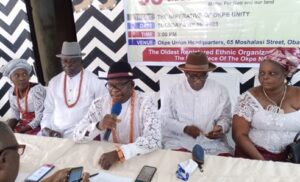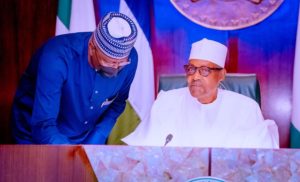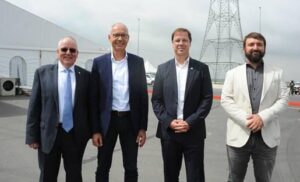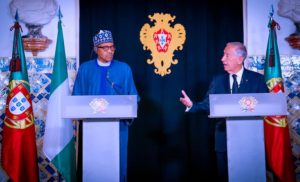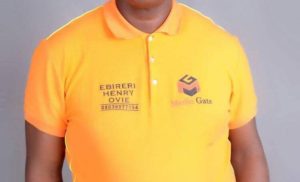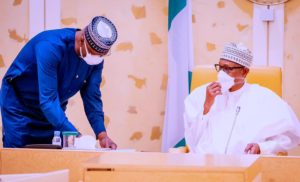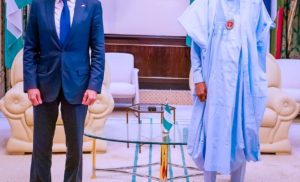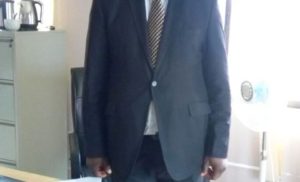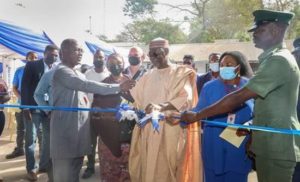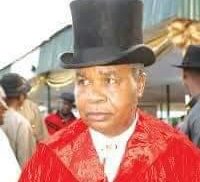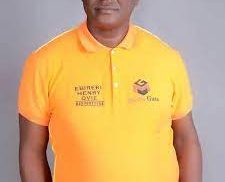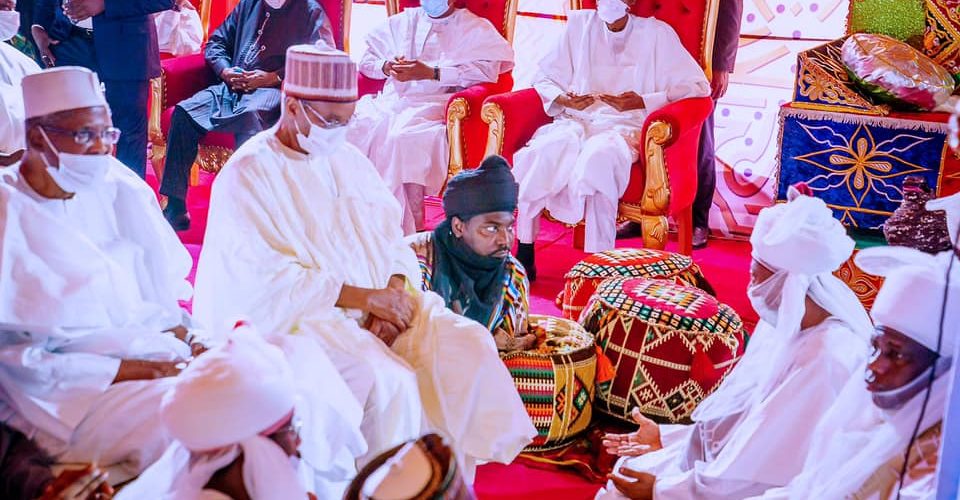
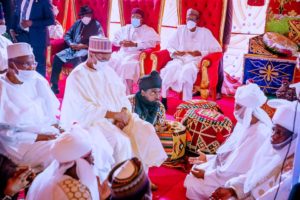
STATEMENT CONCERNING SAMUEL ORTOM, THE GOVERNOR OF BENUE STATE
Governor Samuel Ortom has few political principles. We can see this from the fact that he has changed political party five times during his undistinguished career.
Every time he feels the wind may be blowing in a certain direction, he follows it.
Unfortunately, for the good citizens of Benue State, the most dangerous direction he blows in today is that of sectarianism and ethnicity.
In an attempt to boost his sinking political fortunes, Ortom takes the cheapest and lowest route possible by playing on ethnic themes – and in doing so knowingly causes deaths of innocent Nigerians by inciting farmers against herders, and Christians against Muslims.
Specifically, Ortom stirs up hatred by targeting one single ethnic group in Nigeria – using language reminiscent of the Rwandan genocide.
As was the case in Rwanda where the then Hutu leaders of the country incited their countrymen against each other, claiming there was a “secret Tutsi agenda” over the Hutu, Ortom claims there is a “secret Fulanization agenda” over other ethnic groups in his state and in Nigeria. This is a copy of the language of Hutu Power – which falsely, and intentionally, accused the Rwandan Tutsi of plans to dominate the country.
This wicked talk is aimed at giving cover to his so-called “policy” on the Ranches Establishment Law – which in reality is purely an act of denial of the law – intended to withhold rights and freedoms from one ethnic group alone, whilst inciting race hatred against them amongst all others.
These are not the actions of a man who should be trusted with running public services or holding public office.
For the governor of a major state in Nigeria to be politically driven by ethnic hatred is a stain on our country.
The good, and fair-minded people of Benue State deserve more than this, and we look forward to the next elections when they have an opportunity to restore its greatness.
Garba Shehu
Senior Special Assistant to the President
(Media & Publicity)
August 25, 2021
LAGOS STATE GOVERNMENT
PRESS RELEASE
SANWO-OLU IS POLITICAL BRAND ICON OF THE YEAR
Critical Stakeholders will converge in Lagos at D’podium International Event Centre, Ikeja, on Friday, August 27, 2021, to mark the 18th Anniversary of the Marketing Edge Brands and Advertising Awards of Excellence and celebrate Governor Babajide Olusola Sanwo-Olu’s emergence as Political Brand Icon of the Year.
Governor Sanwo-Olu will receive the award conferred by the Board of “Marketing Edge” – Nigeria’s leading brand and marketing publication – in recognition of his sterling performance in tackling the COVID-19 pandemic in Lagos as well as his laudable strides in health, education and infrastructure among others.
Communicating Governor Sanwo-Olu’s emergence as Political Brand Icon of the Year, the Board of “Marketing Edge” said: “It is obvious to the Board that the urban renewal train of your administration is already moving at top speed towards the Smart City destination, which it envisions for Lagos State, to the admiration of all stakeholders and the applause of even the international community.”
“Marketing Edge” maintained that Governor Sanwo-Olu has remained focused, determined and daring in his promise to move Lagos beyond the common standard of excellence through the T.H.E.M.E.S Agenda – his administration’s six-pillar development plan, which is driving its projects and policies.
The summit, with the theme “Rethinking the Blue Ocean Strategy in Uncertain Times”, will begin with a virtual lecture to be delivered by Mr. Vikhas Mehta, the Chief Executive Officer, Ogilvy Africa on Thursday, 26th August, 2021.
Mr. Sanwo-Olu is “Vanguard” Governor of the Year; “The Nation” Person of the Year, “Leadership” Governor of the Year and “New Telegraph” Governor of the Year, among others.
Gbenga Omotoso
Honourable Commissioner for Information & Strategy
August 25, 2021
PRESIDENT BUHARI PAYS TRIBUTE TO FORMER ONDO MILITARY GOVERNOR, REAR ADMIRAL ABIODUN OLUKOYA
President Muhammadu Buhari sends condolences to government and people of Ondo and Ekiti States over the death of Rear Admiral Sunday Abiodun Olukoya (rtd) who passed on at 72.
The President describes the late Rear Admiral who served as a Military Governor of Old Ondo State (now Ondo and Ekiti) between 1990 and 1992 as a brilliant officer who distinguished himself in his career in the military and performed creditably in Ondo..
President Buhari notes that even after retirement from the military, the late Rear Admiral Olukoya, in his desire for a better society, continued to offer his services to his community as a private citizen.
The President prays Almighty God to grant the deceased eternal rest and comfort his family, friends and associates as they mourn him.
Femi Adesina
Special Adviser to the President
(Media & Publicity)
August 25, 2021
IMPERATIVES FOR A UNITED NIGERIA BY IFEANYI OKOWA
KEYNOTE SPEECH DELIVERED BY HIS EXCELLENCY, SEN. DR. IFEANYI OKOWA, GOVERNOR OF DELTA STATE, AT THE 2021 ANNUAL LECTURE AND SYMPOSIUM ORGANIZED BY RIPPLES CENTRE FOR DATA AND INVESTIGATIVE JOURNALISM (RCDIJ), AUGUST 25, 2021, AT SHERATON LAGOS HOTEL, IKEJA, LAGOS.
PREAMBLE
I begin my address by appreciating the strong commitment of the Ripples Centre for Data and Investigative Journalism (RCDIJ) to the Nigerian Project, which is apparent in its sustained exploration of the theme, Rebuilding Trust in a Divided Nigeria: Advancing the Conversation. I recall that RCDIJ’s maiden exploration of this theme was in 2018, when our Nobel Laureate, Prof. Wole Soyinka, delivered a luminous keynote speech, the relevance of which still endures.
2. I am thankful for the invitation – and honour–to be the Chairman and Keynote Speaker of this year’s event. Indeed, I welcome the opportunity to contribute to the library of thought and information on the subject of nation building. As you may be aware, Deltans are right in the middle of a weeklong celebration of the 30th anniversary of the creation of Delta State. The activities began on Monday this week and will climax on Friday, August 27, 2021, with an Award and Gala Night. It is, therefore, as a result of my high regard for the organisers of this event and the premium I place on the prospects of today’s conversation that I had to put all other responsibilities aside in order to be here today.
INTRODUCTION
3.The theme for today’s dialogue, “Rebuilding Trust in a Divided Nigeria: Advancing the Conversation,” could not have come at a more appropriate time. It is not debatable that Nigeria is passing through perilous times. Aside from during the Civil War (1967-1970), at no time in the chequered history of our beloved country have we been as divided as we are today or witnessed such magnitude of mistrust of ourselves and of our nation.
4.The theme presupposes that trust and unity once existed among the peoples of Nigeria. But was this truly the case? Indeed, there was a time we happily sang “Though tribe and tongue may differ/In brotherhood we stand”, but was that a reality or an aspiration?
5.On the first thought, it would seem like a reality. For, at one time, Nigerians lived freely and effectuated themselves among ethnic groups other than theirs. For example, late Mallam Umaru Altine, a Fulani from Sokoto, was elected the first Mayor of Enugu, the heartland of Igbo nation, in 1952; the Fulani herdsman reared his cattle all over Nigeria, bearing just a stick and not an AK47; the NCNC, led by Nnamdi Azikiwe, an Igbo, in the 1951 elections, won all the five seats in Lagos and seven of the eight seats in Ibadan; and nationalists from the three regions of the country, namely, Nnamdi Azikiwe (East), Tafawa Balewa (North) and Obafemi Awolowo (West) were united in the struggle for the independence of Nigeria from British colonial rule.
6. On the other hand, our history shows that about that same time and beyond, Nigeria generally battled with the issues of mutual distrust, suspicion, prejudice, with the various ethnic nationalities locked in battles for supremacy or minority rights. The early attempts to break up Nigeria derived from the above issues.
7.According to Bayo Ogunmupe, in “The Chequered History of Secession in Nigeria” (https://guardian.ng/opinion/ the-chequered-history-of-secession-in-nigeria/ – retrieved 6/8/2021), the first attempt dates back to 1950 at the Ibadan Constitutional Conference where the ratio of representation was fixed at “44:33:33 for the North, West and East [respectively]. Northern politicians rejected it and the Emir of Zaria said their share must be 50 percent of the seats or they will secede from Nigeria”.
8. Then in February, 1964, “a member of the United Middle Belt Congress (UMBC) in the Northern House of Assembly, Isaac Shaahu, declared that the Tiv people felt unwanted and [would] pull out of the North and the federation as a whole”. Next was Eastern Nigeria, led by its Premier, Dr. Michael Okpara. In December 1964, they threatened to secede, “following disagreements over census and the 1964 general election”.
9. All the above threats to secede eventually petered out, following negotiations and amicable resolutions of contentious issues. But apparently, Nigeria soon lost the capacity, sincerity and trustworthiness to negotiate and resolve contentious issues without resorting to violence. So, in 1966 and 1967, threats transited to actual secession. On February 23, 1966, “Isaac Adaka Boro decided he was not ready to live in a Nigeria ruled by the Igbo [General Ironsi was Head of State then] and [Adaka Boro] declared the independence of the Niger Delta Peoples Republic”. In May, 1967, Col. Chukwuemeka Odumegwu Ojukwu declared the Republic of Biafra. In these two instances, the secessionists had lost trust that Nigeria could offer them security, justice and welfare.
10.Chukwudi Ukonne, in The Republic, seems to summarize the situation at that time as follows:
The leaders of the various regions and tribes… came together briefly to push for independence from British colonial rule. But having achieved this goal in October 1960, the regions had no real common ambition to galvanize their unity. Although many of the leaders of newly independent Nigeria were committed to the pan-Nigerian ideal, [this commitment was] abandoned at the first sign of tension and gave way to the parochial and tribal sentiments which had existed before independence….This post-independence state of affairs is partly to blame for the decimation of Nigeria’s First Republic (1963-1966) at the hands of the Nigerian military, who would go on to rule the country for over 30 years. (https://republic.com.ng › – retrieved 5/8/21).
11.Major-General Johnson Aguiyi-Ironsi’s Unification Decree No 34 of 1966 was a desperate attempt to forge a sense of unity among the component parts of a deeply fractured country. In a nutshell, the Decree imposed a unitary system of government as Aguiyi-Ironsi sought to replace the regions with a strong federal government that he hoped will unify all sections of the country. This has proved to be counter-productive, as it is the root of the unitarism in governance and has become a political albatross. It was also an exercise in futility as the seeds of discord, sowed by the first coup, produced a counter coup that ousted Aguiyi-Ironsi months later.
12.It is, therefore, fair to say that, since her creation, Nigeria has been searching for ways and means to forge a common identity. The Unity Schools, the Federal Character principle and Quota System, enshrined in the Constitution since 1979, and the National Youth Service Corps Scheme are some of the initiatives that were introduced to elicit better understanding, foster cooperation, engender a sense of belonging, and create a sense of oneness among the component parts of the Federation.
THE STATE OF NIGERIA TODAY
13. Despite the above initiatives and legislation, a huge trust deficit and sharp divisiveness still prevail in the Nigerian polity. The common index of these is the various agitations for secession from different parts of the country.
14. Other manifestations of lack of trust in the system and the state of a divided Nigeria are:
– the unusually large number and the high frequency of demonstrations and protests, the most prominent of which was the 2020 #EndSARS nation-wide protests;
– labour discontent and frequent strikes often due to Government’s failure to implement negotiated and duly signed agreements;
– persistent calls for restructuring, fiscal federalism and devolution of powers to the States;
– insurgency, banditry, kidnapping, etc, leading to barbaric destruction of lives and property. The Nigerian Security Tracker of the New York-based Council on Foreign Relations reports that 54,362 were killed from 1st January 2015 to 2nd August 2021(https://www.cfr.org/nigeria/nigeria-security-racker/p29483 –retrieved 5/8/21).
15. Still other manifestations of mistrust and disunity are:
– the proliferation of zonal security outfits and ethnic militias because, apparently, the Federal Security Agencies have become either ill-equipped, poorly funded or incapable to protect all citizens;
– increasing number of non-governmental organizations for the protection of human and child’s rights;
– increase in unemployment- and poverty-induced crimes, such as cybercrimes, human trafficking and international prostitution.
16. All of these derive from general discontent with the quality of governance, frustration and disappointment of the citizenry who feel betrayed by those they elected into power, and anger, raw anger, at the deplorable state of the nation.
CAUSES OF DISUNITY
17. The crux of the matter is that the absence of a national ideology that all the component parts of the country subscribe to is why we are yet to forge that sense of oneness and unity. In the absence of a shared national vision or aspiration, primordial loyalties and sentiments largely hold sway among the citizens.
18.It is not a secret that during elections most people vote along sectional lines, be it religion or ethnicity. In the corporate world, the academia and other sectors of our national life, our default mode is to queue behind someone from our ethnic group or who shares our religious beliefs. Even the war against corruption is subjected to all manner of scrutiny based on our ethnic affiliations and religious persuasions. The sad reality is that we seem to derive more comfort, protection and security from our ethnic identity. The concept of one Nigeria is still just that – a concept.
19.The Americans have the American Dream, the British, Rule Britannia, while, in recent times, the United Arab Emirate has developed a vision to be the biggest and the best in everything she does. What can we point to as Nigeria’s overarching vision that motivates the average citizen or that everyone aspires to actualize? How can we have and pursue an overarching vision when we think Fulani or Hausa or Yoruba or Igbo instead of Nigeria?
20.Bad governance at different levels of government is a major contributory factor to disunity in the country. Bad governance is what results when (a) a State, “based on the principles of democracy and social justice” (as Nigeria is described in Section 14 (1) of the 1999 Constitution as amended), fails to uphold, in all its operations, “the principles of democracy and social justice”; and (b) when a Government fails to fulfill its “primary purpose” which, according to Section 14 (2) (b) of the 1999 Constitution is to provide “the security and welfare of the people”.
21.Indices of bad governance in Nigeria are legion, viz;
-ethnicity or tribalism and nepotism – it is regrettable that over the years, we have had leaders who chose to exploit the ethnic and religious fault lines in the country to advance their selfish political interests;
-lopsidedness in power sharing (marginalization of some sections of the country);
-corruption, lack of accountability and unproductivity, all resulting in poor economic growth;
-religious bigotry and intolerance;
-inequality and inequitable distribution of wealth;
-insecurity – personal, economic and food insecurity – inflicted on the country largely by criminal herdsmen and bandits;
-unemployment (the rate in Nigeria in 2020 was 32.5%);
-poverty (the rate in Nigeria in 2021 is 40%, which translates to 80 million citizens and it is estimated to be 45% or 90 million citizens in 2022);
22.Another factor responsible for our current disunity is the lack of political will to devise a constitution that supports true federalism. The 1999 Constitution (as amended) centralizes political and economic powers in the Federal Government and emasculates the States by denying them powers to secure their own territories and control their natural resources for the development of their territories and people.
23.Take allocations from the federation account, for instance. While the federal government takes 52.68%, the 36 States and 774 Local Governments that carry most of the burden of development get 26.72% and 20.60%, respectively! This does not augur well for effective grassroots development, inclusive economic growth and social cohesion.
24. Also anti-true federalism is the provision of the 1999 Constitution (as amended) regarding the creation of Local Government Areas, which is the empowerment of the National Assembly and the Presidency to ratify such creation by states. A true federal structure recognizes the autonomy of the federating units in connection with powers devolved to them. It is, therefore, aberrant for the State to create Local Government Areas and submit same to the Federal Government for approval!
25. The disenchantment and alienation of our teeming population of youths is another disuniting factor. They feel hard done by Nigeria’s current climate of hopelessness, massive unemployment, insecurity of lives and property, poor quality disruption-ridden educational system, inaccessibility to quality health care,rising cost of living, and a ruling class living extravagantly in the face of the widening gulf between the rich and poor.
26.Truth be told, many of our youths see no future for themselves in this country. This was why the EndSARS protest of 2020, which began as a protest against police brutality, quickly snowballed into a mass movement against a country that has failed them. Many parents here can testify that our youths would rather migrate, even illegally, to greener pastures in other countries and, where migration isn’t possible, resort to anti-social behavior inimical to the unity, peace and progress of the country.
27.The last cause of disunity in Nigeria which I want to mention is the growing lack of faith in the electoral process. The great desideratum of modern democracy is that it must be participatory and undergirded by some non-negotiable fundamentals, notably the power of the people to choose their leaders as well as majority rule and minority rights. These must be in place for a country to be seen as free and democratic.
28.The current lack of faith in the electoral process by the Nigerian electorate has resulted in the massive apathy and self-disenfranchisement prevalent during elections. The people feel that their votes do not count and have, therefore, sunk into disillusionment, resentment and resignation.
BUILDING TRUST IN A UNITED NIGERIA: RECOMMENDATIONS
29.While I empathize with people who lament the current state of affairs in Nigeria, I do not believe that the solution is to balkanize the country. I strongly believe that we are better and stronger together, and that, with appropriate, visionary leadership and good governance, we can turn our diversity into a great source of strength and a springboard to build a strong multi-ethnic and multi-religious country that will be the envy of other nations.
30.Leadership is key. As 2023 approaches, the focus should be on electing a pan Nigerian as president, a person with the capacity and charisma to cast a vision for Nigeria and rally all Nigerians behind it. We need a selfless, sacrificial, sincere, broadminded, caring and capable president that will inspire hope and confidence in the country; a leader who values merit over mediocrity, competence over cronyism, while upholding the fundamental principles of fairness, equity and justice. This country brims with immense human and natural resources, which cry to be effectively and efficiently harnessed by a responsive – and – responsible leadership for the socio-economic development of the country.
31.The experience of some balkanized countries, such as Yugoslavia, which was balkanized into seven states, shows that, until the fundamental issues of good governance – justice, socio-economic equality, mutual ethnic and religious tolerance, inclusiveness, etc. – are effectively addressed in the mother nation, each new country will be bedeviled by the same divisive problems already in their genes. So, why not tackle the problems in the mother nation that would make a greater impact on the world unlike the tinier new nations?
32. The Federal Government should frontally and transparently tackle insurgency, banditry, kidnapping, criminal herdsmen operations and all purveyors of insecurity in a way to obviate the popular impression that they are executors of a pre-planned genocide. The war against terror is seriously undermined when ransom is paid to these criminal elements.
33.Aside from a modern security architecture anchored on technology, we must muster the political will to deal decisively with criminals, regardless of their ethnic groups, religions or status. In America and other developed countries of the world, that is what makes their institutions stronger than individuals and keeps even the poorest in the society confident of getting justice before the law. For democracy to be sustained and the goodwill of the populace retained, impunity must not have even a toehold in our body polity. Our security agencies must be well funded and equipped; training of personnel to build capacity and collaboration between agencies is key. Furthermore, directives must be clear and goals unambiguous.
34.Similarly, to help restore faith in the electoral process, there should be stiff penalties for electoral violence and other malpractices, regardless of which party is culpable. Election results should also be transmitted electronically at the point of counting the votes at the poling units to remove the opportunities for later alterations of figures. It goes without saying that the refusal by the National Assembly to include a mandatory electronic transmission of election results in the Electoral Act has deepened the distrust that the public has for politicians and the ruling class.
35. It should be clear to everyone by now that glib, official declarations like “The unity of Nigeria is non-negotiable” or “The unity of Nigeria is sacrosanct” cannot diffuse the tension, resentment, anger and sectarianism prevalent in the country today. Only conscious, consensual action to remove the causes of mistrust and disunity identified above can.
36. I also think it is time we embrace the idea of a Truth and Reconciliation Commission with membership drawn from the six geo-political zones. I do not canvass for a Commission that will dig into history to apportion blames and pass judgment on political leaders. Rather, I envisage a Commission that will freely discuss the current state of the nation, debate the things that bind or divide us, proffer strategies to reconcile our differences, and recommend a sustainable path to true nationhood based on good governance. I think this is important in the light of all that the country is going through right now.
37.Nigeria can only grow if ethnic, religious and tribal divides dissolve, and a pan-Nigeria goal is truly desired and pursued by all. Despite its challenges and leadership defects and the circumstances of its birth in 1914, we have come to be a nation. We must unite and make it work for all. We had declared in our National Anthem (composed in 1960) – “Though Tribe and Tongue may differ, in brotherhood we stand”. The political class, religious/community leaders and elite must sign up to this, and our leaders must begin to act the pan-Nigerian dream into reality.
38. The governance system at all levels particularly at the federal must be just, fair, equitable and seen to be inclusive. There is too much power at the centre, and this needs to be devolved to the federating units for greater effectiveness and efficiency. The devolution of powers and resources to the subnational governments, and the guaranteeing of a constitution that allows equity, justice for all and inclusiveness in governance such that none is left out or oppressed is imperative. Urgent steps need to be taken to ensure fairness in resource allocation, taking into cognizance the degradation of the environment by the Oil and Gas resources and the impact on the health and livelihood of Niger-Deltans.
39.Inter-faith dialogue and building of networks should be institutionalized. Different religious identities need to seek mutual understanding, respect and tolerance, which allows each faith to live, appreciate and cooperate with one another. Government and faith-based organisations must, through advocacy, seek for the common good, and put processes in place for prevention of conflicts, peacemaking and post-conflict rebuilding.
40.The herdsmen/farmers conflict is fast becoming the greatest threat to our nation’s unity and economic well-being. The nomadic Muslim Fulani pastoralists and the largely Christian farmers of various ethnicities have continued to clash resulting in loss of economic crops, cattle and life. This threat to our country’s stability and unity needs to be addressed urgently by our federation. It is my opinion that ranching and cattle colonies with support by the federal Government is a way out of this challenge. The Federal Government of Nigeria must urgently tackle this challenge to reduce the level of insecurity and to ensure food security. Criminal herdsmen must be dealt with within our Laws and Internally Displaced Persons need to be quickly resettled in their homes.
41.The media must come to the rescue. Government at various levels should, as a matter of exigency, enlist the support and cooperation of the media in advocating for peaceful coexistence and national unity. Generally, I think the media should be more discerning and restrained in giving voice to violent extremists and criminals in our nation. Giving undue recognition to these elements has the potential to fuel ethnic conflict, electoral violence, and exacerbate the divisions among us.
42. We must also, through persuasion and advocacy, empower the media to play a defining role in building and promoting non-violent, credible elections. The independence of the media is critical for credible journalism. We must, therefore, not stifle them under any guise.
43. Too many Nigerians are falling into the poverty bracket daily, and the percentage of the unemployed and underemployed is worrisome. This is becoming increasingly compounded by insecurity and our rising population. Hence, we need to aggressively begin to re-tool our youths with entrepreneurship development programmes. Also, a voice of strength and policy to space out births and control our population will help. Poverty in itself creates resentment to governance structures and unemployment heightens insecurity.
44. Ladies and gentlemen, I have not made recommendations that are not implementable. Delta State, of which, by the grace of God, I am Governor, is a microcosm of Nigeria because she is peopled by different ethnic nationalities. She has had inter-ethnic conflicts/clashes, fatal boundary disputes, especially over oil-bearing land, and political tensions. She has had high unemployment and poverty rates. Luckily, successive governments of the State have tackled the issues in different ways, and I am building on the foundation they laid. And the ruling People’s Democratic Party in the State has a policy of rotating the governorship among the three Senatorial Districts of the State for the purposes of equity and inclusiveness.
45. My administration has followed on the above trajectories through equitable distribution of appointments and projects across the three Senatorial Districts. We have erected structures for conflict resolution and peace building. They include the Office of the Special Adviser on Conflict Resolution and Peace Building and the Delta State Advisory and Peace Building Council with a membership of 42 (forty-two) respected men and women in various fields drawn from every local government area of the State. These structures have proactively prevented crises by promptly and effectively resolving disputes.
46.We also have a deliberate policy to tackle youth unemployment through skills training and entrepreneurship development programmes. I believe that the way out of the unemployment quagmire is to equip the youth with the technical know-how, vocational skills, values and resources to become self-employed, as distinct from one-off empowerment. This is what my administration has done by instituting various skills training and entrepreneurship development programmes, which include:
– Skills Training and Entrepreneurship Programme(STEP);
– Youth Agricultural Entrepreneurs Programme(YAGEP);
– Graduate Employment Enhancement Programme(GEEP);
– Rural Youth Skills Acquisition Programme(RYSA);
– Girls Entrepreneurship Skills Training (GEST); and
– Women Entrepreneurship Skills Acquisition Programme (WESAP).
47. These programmes are trainee-centred and service-oriented. The sectors and activities covered include agriculture, agricultural value chain services, vocational skills-based microenterprises and cottage enterprises. Furthermore, the training and mentoring processes aim beyond raising entrepreneurs to producing leaders and managers that have high levels of personal responsibility and effectiveness. I am pleased to let you know that after six years of faithful implementation of these programmes, we have trained and given business support packages to several thousands of youths.
48. Following the success of these interventions and other efforts in promoting technical education, Delta State was ranked the Best State in Human Capital Development in the 2017 States Peer Review by the National Competitiveness Council of Nigeria. Also in 2020, Delta was adjudged to be the Second Least Poor State, coming only after Lagos, Nigeria’s business hub, according to the Nigerian Bureau of Statistics (NBS).
CONCLUSION
49.I have briefly touched on issues relating to the theme of this dialogue. I trust that subsequent presentations and discussions would delve more deeply into the issues that I have raised as well as those that I may not have touched on.
50.It is my hope that the communique that will emanate from this gathering will be useful in guiding our political leaders to build a united and prosperous Nigeria that will elicit the trust and loyalty of all citizens and become the envy of many nations.
51.It is on this note that I wish us fruitful deliberations in this meeting.
52.Thank you for your time and attention.
53.God bless the Federal Republic of Nigeria.
54.God bless us all.
Office of the Governor
Government House
Asaba
August 2021
ATTACK ON NDA WON’T DAMPEN RESOLVE OF OUR MILITARY TO BRING DECISIVE END TO CRIMINALITY, PRESIDENT BUHARI VOWS
The attack launched on the facility of the Nigerian Defence Academy (NDA) on Tuesday, rather than throw a dampener into the morale of our Armed Forces as it is intended to, will buoy their determination to make a decisive end of criminality in the country, President Muhammadu Buhari has said.
Noting that the attack, which led to loss of lives, came at a time that the military had put insurgents, bandits, kidnappers, and other types of criminals on the retreat, the President says the heinous action would accelerate the total uprooting of evil in the polity, which members of the Armed Forces are solidly resolved to accomplish in the shortest possible time.
Commiserating with the families who lost their loved ones, and praying God to comfort them, President Buhari vowed that the deceased would not die in vain, as the degenerate act would have consequences that will eventually clean the country of vermin, and emancipate the polity from deliberate, targeted and contrived atrocious acts.
The President thanks all Nigerians who value and appreciate the efforts of our military, and urges those playing hateful politics with the dastardly act to desist, noting that rather than recriminations, this is the time for all patriots and people of goodwill to support and encourage those who are in the vanguard of the battle against wickedness in the land.
Femi Adesina
Special Adviser to the President
(Media and Publicity)
August 25, 2021
Delta confirms outbreak of Avian influenza
Delta Government on Wednesday confirmed the fresh outbreak of Avian Influenza, also known as Bird Flu with an estimated population of 164,473 birds so far affected in farms across seven Local Government Areas of the state.
The Commissioner for Agriculture and Natural Resources, Mr. Julius Egbedi disclosed this in a Press Conference jointly chaired by the Commissioner for Information, Mr. Charles Aniagwu, in Asaba. Egbedi said that the affected farms were located in Udu, Oshimili South, Ughelli North, Ughelli South, Okpe and Sapele Local Government Areas, stressing that samples from the reported farms had been sent to the National Veterinary Institute, Jos, and all were confirmed to be the H5N1 strain of the Avian Influenza.
He said that the state government, through its Department of Veterinary Services, had disinfected the affected farms and had also forbidden the operation of poultry farms for the next three months
Okowa tasks IGP on police-citizens relations
Delta Governor, Sen. (Dr) Ifeanyi Okowa, on Monday, called on the Inspector-General of Police (IGP), Mr Alkali Baba, to strive toward bridging the gap in the relationship between the police and citizens of the country.
Okowa made the call when he received the IGP on courtesy visit at Government House, Asaba, and pointed out that growing lack of trust between the police and the people resulted from poor relationship.
He advised that the IGP should interact more with different stakeholders with a view to bridging the gap between the Police Force and the people, adding that community policing could only work better with the cooperation of citizens.
According to Okowa, lack of citizens’ trust in the police requires that your office interact more with different stakeholders with a view to bridging the gap between the Nigeria police and the people.
He remarked that tour of various police commands and formations across the country by the police boss would help to bridge such gap.
“With your infectious personality, I have no doubt that you will be able to attract more people to support your policing vision of enhancing police primacy in protection of lives and property.
“It is our prayer that you will continue to work hard and partner other sister security agencies to ensure that Nigeria gets more and more peaceful in the days ahead,” he said.
The governor said that there was a need for joint effort to tackle security challenges in the country, and explained that “in Delta, we are thankful that the collaboration is real and it’s helping us to achieve results, and we hope it continues”.
He said that there was need for proper funding of the police with logistics and equipment to enable the force to be more confident in its work, especially when combating criminal elements.
“If we are able to fund the police to provide for more data and extensive intelligence-gathering, the more likely we are going to achieve faster result.
“Community policing can only work better with the cooperation of the people, and in Delta, we are in the process of completing the enactment of a law that will establish Community Security Corps to work in partnership with the police for effective crime prevention,’’ Okowa stated.
On herders-farmers clashes, he said the state had been able to manage it with the structures put in place to ensure that the clashes were minimised.
“Whatever you can do to strengthen the police command in Delta, we urge you not to hesitate in providing such support,” the governor assured, adding that the state government would continue to support and cooperate with the police within available resources.
Earlier, the IGP had said that he was in Delta as part of his familiarisation tour of state police commands and formations across the country to intimate them on his vision for the force under his leadership.
He appreciated the governor for continued assistance to Delta command, adding that it had remained one of the best that had added value to policing in terms of strengthening the force with creation of new area commands and establishment of security outfits to compliment the police.
“I am here on a facility tour of the Delta State Command as part of my visit to police formations in each state to interact with the officers and men on my vision for the force.
“To improve crime prevention in the state and country, the Police have adopted the community policing strategy as model for bringing police nearer to the people and we seek the support of stakeholders for the implementation,” Baba stated.
Okowa congratulates Sultan of Sokoto at 65
Delta Governor, Sen. (Dr) Ifeanyi Okowa, has congratulated the Sultan of Sokoto, Alhaji Sa’ad Abubakar III, as he clocks 65 years.
In a statement by his Chief Press Secretary, Mr Olisa Ifeajika, in Asaba, the governor commended the Sultan for promoting and advancing the course of peace, unity and religious harmony in the country.
He said that Nigerians remained grateful to the Sultan Abubakar for his astute contributions to peace-building, co-existence and religious tolerance among Nigerians.
The governor noted that the Sultan’s wise counseling on national issues had continued to help in keeping leaders and followers on track and stimulating genuine interest of the people in nation-building.
“On behalf of my family, the government and people of Delta, I congratulate His Eminence, the Sultan of Sokoto, Alhaji Sa’ad Abubakar III, on the occasion of his 65th birth anniversary.
“We celebrate your outstanding and exemplary role as head of Jama’atul Nasir Islam (JNI), President-General of Nigerian Supreme Council for Islamic Affairs (NSCIA) and co-Chairman of Nigeria Inter-Religious Council (NIREC).
“We also appreciate your contributions to ending insurgency, banditry and other violent crimes in parts of the country and for the promotion and protection of human life and dignity of man.
“As you continue to use your exalted throne to promote peace, unity and positive development in the Caliphate and across our nation, be assured of the support, partnership and co-operation of the government and people of Delta.
“It is my prayer that Almighty God grants you many more years of good health to continue your patriotic services to the nation,” he said.
Okowa condoles with families of 7 road accident victims
Governor Ifeanyi Okowa of Delta has sent his deepest condolences to the families of seven women who died in a road accident on the Orogun-Agbarha road in the state.
The women, all from Bonadi and were returning from a marriage ceremony in Agbor on Saturday reportedly lost their lives when the driver of the Sienna bus conveying them lost control of the vehicle, resulting in a plunge of the car into a nearby carnal.
Three out of the 10 passengers in the vehicle were reported to have survived the incident.
In a condolence message by his Chief Press Secretary, Mr Olisa Ifeajika, Okowa sympathised with the families of the victims as well as Bomadi Local Government and the entire Ijaw people on the tragic incident.
He commiserated with the people of Peretoru communities where the dead hailed from.
“It is with a deep sense of sorrow that I commiserate with the families of seven Bomadi ladies that lost their lives in a fatal motor accident on Saturday, August 21, 2021, along Orogun-Agbara road on their way from a wedding at Agbor.
“Indeed, their death has caused a dark cloud and great sorrow for their families.
“On behalf of the government and people of Delta, I extend our heartfelt condolences to the Chairman and people of Bomadi Local Government Area and the families of our departed women.
“Their untimely death has undoubtedly caused great pain to their families and I pray that such tragedy will never occur again.
“May God grant the families and loved ones the fortitude to bear the irreparable loss and may their souls rest in peace.” the governor stated.
“I almost passed out.” Funke Akindele discusses producing highest-grossing movie Omo Ghetto, work ethic and her plans for the future
Going from being arraigned for breaking the COVID-19 precautionary rule to becoming the highest-grossing actress, producer and director, Funke Akindele has become a legend in Nigeria’s entertainment industry. On this week’s episode of #WithChude, the multiple award-winning producer, director, screenwriter, and actress discussed the work behind the production of her blockbuster movie Omo Ghetto, her work ethics and more with host and co-founder Joy Inc., Chude Jideonwo.
Talking about the process that went into the making of Omo Ghetto, Funke Akindele said, “I became the PA, makeup assistant, wardrobe manager. I styled the movie, designed the production, because this is what I live for. I gave everything to Omo Ghetto: The Saga. I had sleepless nights, swollen eyes.”
Playing multiple roles paid off but it took a toll on the actress. She revealed that shuffling in between roles required her learning new things and constantly going beyond her capacity. She said, “I trained for a month for all the fight sequences. I had to fight for a month with everybody. I had to jog. I had to shed weight. I had to be in the picture. I was directing, acting- at some point, I almost passed out. They had to bring ice and put all over me.”
However, this did not stop the actress’ pursuit of making the now blockbuster movie. She told Chude about how she kept pushing and giving her team the motivation they needed to keep going. The result was the highest-grossing movie in Nigeria entertainment history.
This phenomenal feat was accomplished a year after she was dragged in the mud for allegedly breaking the COVID-19 rule. Funke disclosed that that period was so tough for her that at some point she considered death.
“When I was told to write my statement, I said, ‘I wish I could just die. I didn’t do anything wrong. Let me just die so it will cover the whole thing”, she said.
She further revealed that she had spent a lot of time crying and wondering what she could have done differently. Her mom and husband, however, helped her get through it with words of encouragement.
Today, Funke Akindele is a household name in the movie industry and continues to support other upcoming actors and actresses.
ELDER YEMI AKINWONMI REPLACES UCHE SECONDUS
The Deputy National Chairman (South) of the People’s Democratic Party (PDP), Elder Yemi Akinwonmi, has taken over the affairs of the opposition party.
Akinwonmi cited Section 35 (b) of the PDP Constitution to support his action.
The Acting National Chairman also suspended the National Working Committee meeting of the party indefinitely.
A Court in Rivers on Monday granted an interim order, restraining Prince Uche Secondus from parading himself as the National Chairman and member of the People’s Democratic Party (PDP).
This is contained in a statement issued by Mr Kelvin Ebiri, the Special Assistant (Media) to Rivers Governor on Monday in Port Harcourt.
According to the statement, Justice Okogbule Gbasam of the Degema Judicial Division presiding over a vacation court in Port Harcourt, granted the order, pending the determination of the substantive suit.
This followed a suit, no. PHC/2183/CS/2021 filed by Mr Ibeawuchi Alex and three others, listing Secondus and the PDP as respondents.
The court granted the applicants’ prayers, after reading the affidavit in support of the motion ex parte and the written address and hearing the submission of Mr H.A. Bello, counsel to the applicants.
The order also restrained Secondus from performing the functions of national chairman of the PDP, including calling, attending or presiding over any meeting of the party, among others.
The order restrained Secondus also from participating in any activity of the party whatsoever whilst on suspension as a member of the party pending the hearing and determination of the motion on notice.
The court also granted leave to serve by substituted means, the originating summons, motion on notice, all orders made by the court and all subsequent processes on the respondent
It further granted leave to serve by substituted means, orders made by the court on the respondents by publishing same in the Nation Newspaper.
LAGOS STATE GOVERNMENT
OFFICE OF THE CHIEF PRESS SECRETARY TO THE GOVERNOR
PRESS RELEASE
SANWO-OLU MOURNS SENATOR DUROJAIYE, SAYS HE WAS A GREAT NIGERIAN
Lagos State Governor, Mr. Babajide Sanwo-Olu, has mourned the passage of the chieftain of the National Democratic Coalition (NADECO) and former distinguished Senator Olabiyi Durojaiye.
Governor Sanwo-Olu described Senator Durojaiye, as a passionate leader who served his country meritoriously as a public servant, human rights activist, politician and seasoned administrator.
Senator Durojaiye, the immediate past Chairman of Nigerian Communications Commission (NCC) and Afenifere chieftain, died on Tuesday August 24 at the age of 88 years.
Governor Sanwo-Olu in a condolence message signed by his Chief Press Secretary, Mr. Gboyega Akosile, on Tuesday said the late legal practitioner, politician and Afenifere chieftain spent his life in the service of humanity, particularly for the emancipation of the Yoruba people and defense of Nigeria’s democratic system.
He also praised the late Senator Durojaiye’s contribution to Nigeria’s democracy, especially his fight, alongside other progressive elements in the country during the annulment of the June 12, 1993 presidential election and the dark days of the military junta for the enthronement of constitutional democracy in Nigeria.
The governor also commiserated with Ogun State Governor, Prince Dapo Abiodun, and the entire people of the State, especially, indigenes of Ijebu-Igbo, on the demise of their illustrious son and elder statesman.
He said: “On behalf of the Government and people of Lagos State, I want to express my sincere and heartfelt condolences to the family, friends and associates of the late Senator Olabiyi Durojaiye as well as members of the political family of the late sage, Chief Obafemi Awolowo and entire Yoruba people.
“The death of Senator Durojaiye is a colossal loss to the country. He made lots of positive contributions during his lifetime to the growth and development of Yorubaland and Nigeria. He fought along with several other patriots and pro-democracy activists tirelessly for enthronement of democracy in Nigeria.
“He wrote his name in gold as a tireless fighter and an advocate of democratic government. He played a crucial role as chieftain of NADECO in the agitation for the actualisation of the annulled June 12, 1993 presidential election and return of civilian government in May 29, 1999. Despite being arrested and imprisoned by the military regime of General Sani Abacha, he never gave up the struggle for Nigeria’s democracy.
“I pray that God will grant him eternal rest and give his immediate family, friends, political associates, Afenifere, the people of Ijebu-Igbo and Ogun State, the fortitude to bear the irreparable loss.”
SIGNED
GBOYEGA AKOSILE
CHIEF PRESS SECRETARY
AUGUST 24, 2021

